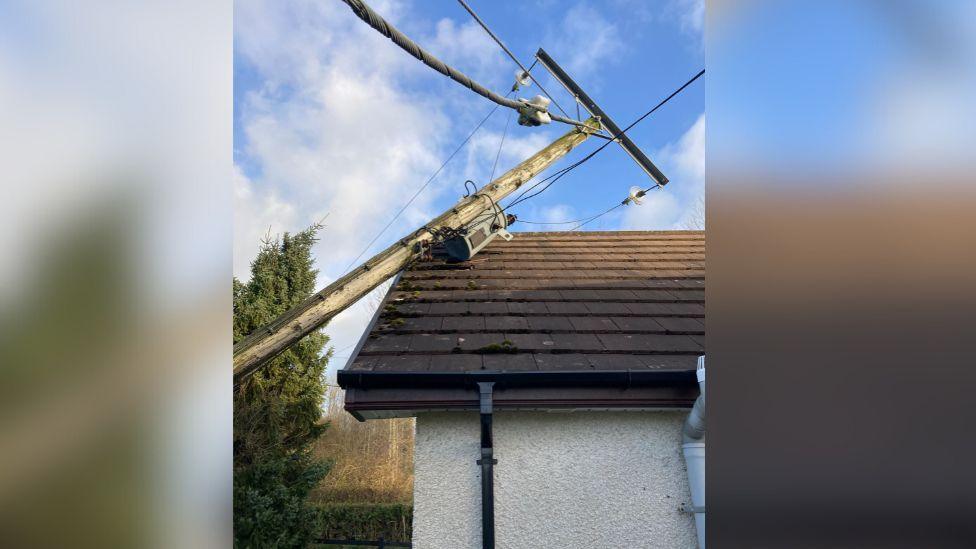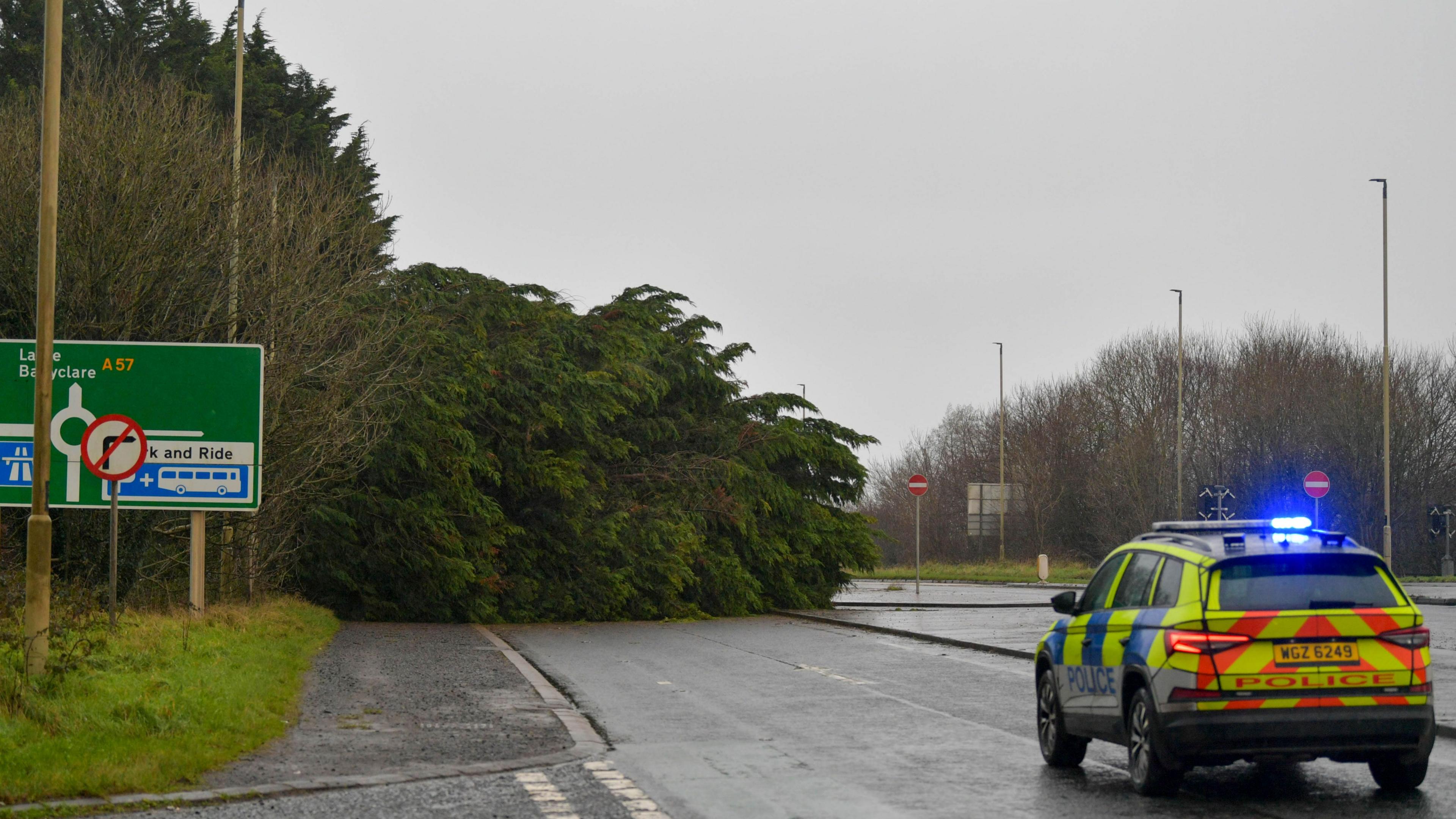Fewer than 500 still without power after Storm Darragh
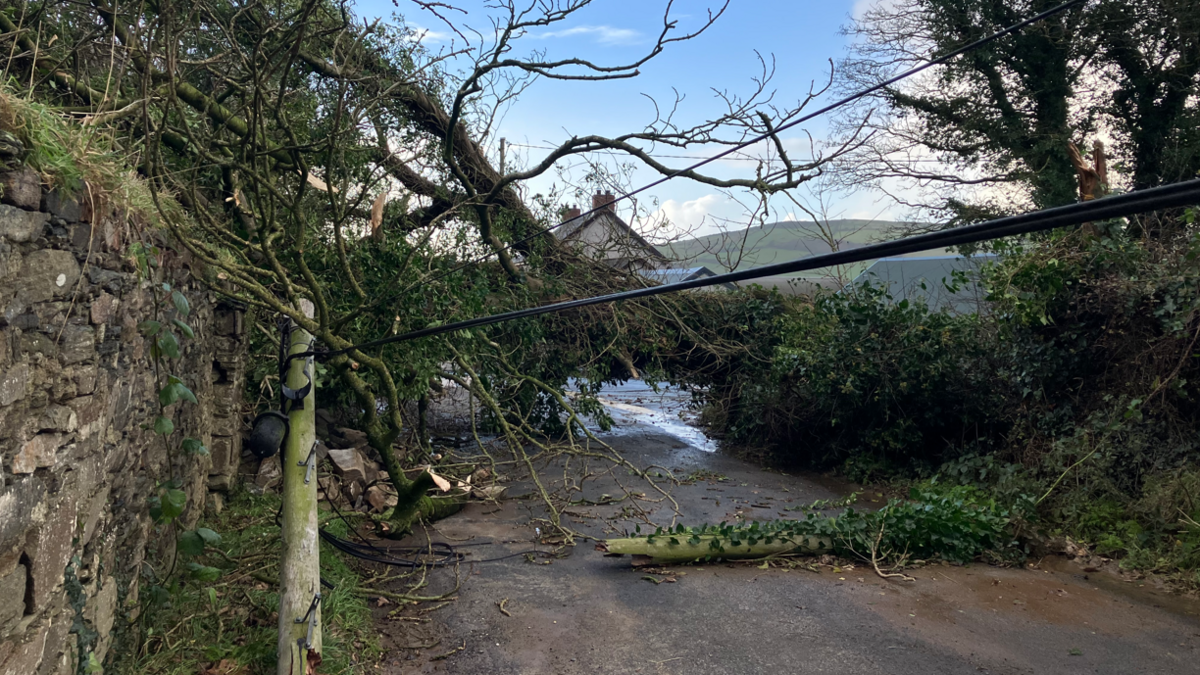
An electricity pole was brought down by a falling tree on the Rushall Road in Ardmore, County Londonderry
- Published
NIE Networks are still working to restore electricity to just under 500 customers following Storm Darragh.
About 95,000 homes in Northern Ireland were without power at the height of the storm over the weekend due to the strong winds.
Several community assistance centres opened on Monday to help those still without power.
They were located in Craigavon, Ballymena, Kilkeel, Ballymoney, Omagh, Dungannon and Donaghadee.
NIE Networks estimated that the vast majority of customers would be restored by Monday evening.
Contractors from Scotland were due to arrive in Northern Ireland on Monday afternoon to help with the restoration works.
The Energy Networks Association, which represents energy networks in the UK, said as of 21:00 GMT on Monday about 38,000 customers were without power.
In the Republic of Ireland, just under 30,000 homes and businesses remained without power as of 12:30 local time on Monday. There was no further update available on Monday night.
ESB Networks told Irish broadcaster RTÉ that some customers could be without supply for "approximately a week" because of the scale and severity of the damage in places.
Its delivery manager Cormac Collins said Storm Darragh was "one of the most severe storms we have received in the last number of years".
He said crews and contractors are "really into the difficult stage of the storm restoration now".
Mr Collins said that crews would be working to repair faults "over the coming days and probably up to the end of the week".

Desi Houston said he hoped his power would be back on soon
Lisburn farmer Desi Houston has been using a generator to keep his farm running since Saturday.
Mr Houston, who owns a farm on the Ballinderry Road, was without power over the weekend.
He said he saw a "flash of light" when trees fell on an electricity pole shortly after 01:00 GMT on Saturday.
He has been using a generator to keep the freezers, which are full of Christmas food, running and to put on lights to feed the cattle.
Ferries cancelled
Stena Line and Irish Ferries cancelled several ferry crossings between Dublin and Holyhead on Monday and Tuesday.
A spokesperson for Holyhead port said that on Saturday morning during Storm Darragh, "an incident occurred at Holyhead Port causing damage to port infrastructure".
"As a result, Holyhead Port is currently closed to marine traffic and, at this time, it is expected that the port will remain closed until 18:00 Tuesday at the earliest, while a thorough assessment is conducted," the spokesperson added.
In a statement to BBC News NI, Ger Hyland, President of the Irish Road Haulage Association, said that businesses were having to "twist and turn to make it work" in the face of weather-related delays.
"Issues like these tend to leave us three to four days behind, we end up having to play catch up," he added.
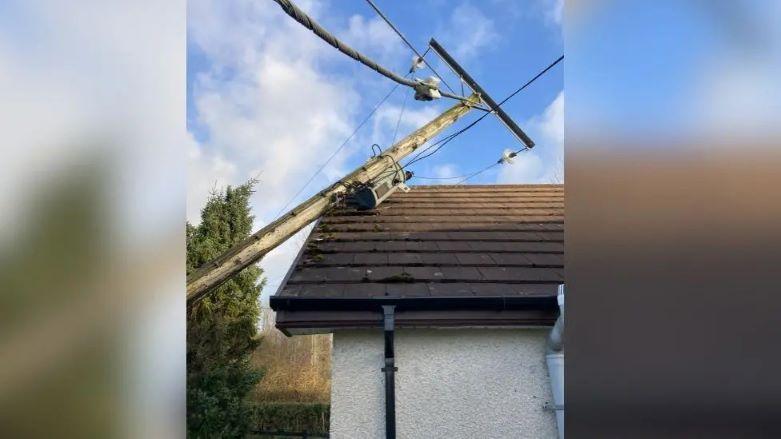
This scene in Markethill Road, Craigavon, was replicated across Northern Ireland
In Northern Ireland some road closures were also still in place on Monday evening due to fallen trees and electricity poles:
In Carrickfergus, West Street was closed after the fire service declared a derelict building unsafe
Traffic signals on the New Forge Road in Magheralin and the Bank Road in Larne are not working due to power cuts, and motorists are advised to approach with caution
Shanco Road in Clogher, County Tyrone, closed due to fallen power lines
Shrigley Road in Killyleagh closed as a tree brought down electricity cables
Warren Road in Donaghadee closed between the New Road and Stockbridge Road due to a faulty electrical pole
Several road closures in Antrim including Old Staffordstown Road, Rough Lane, Holestone Road, Kingscourt and Bridge End Road
See here, external for further updates on road closures.
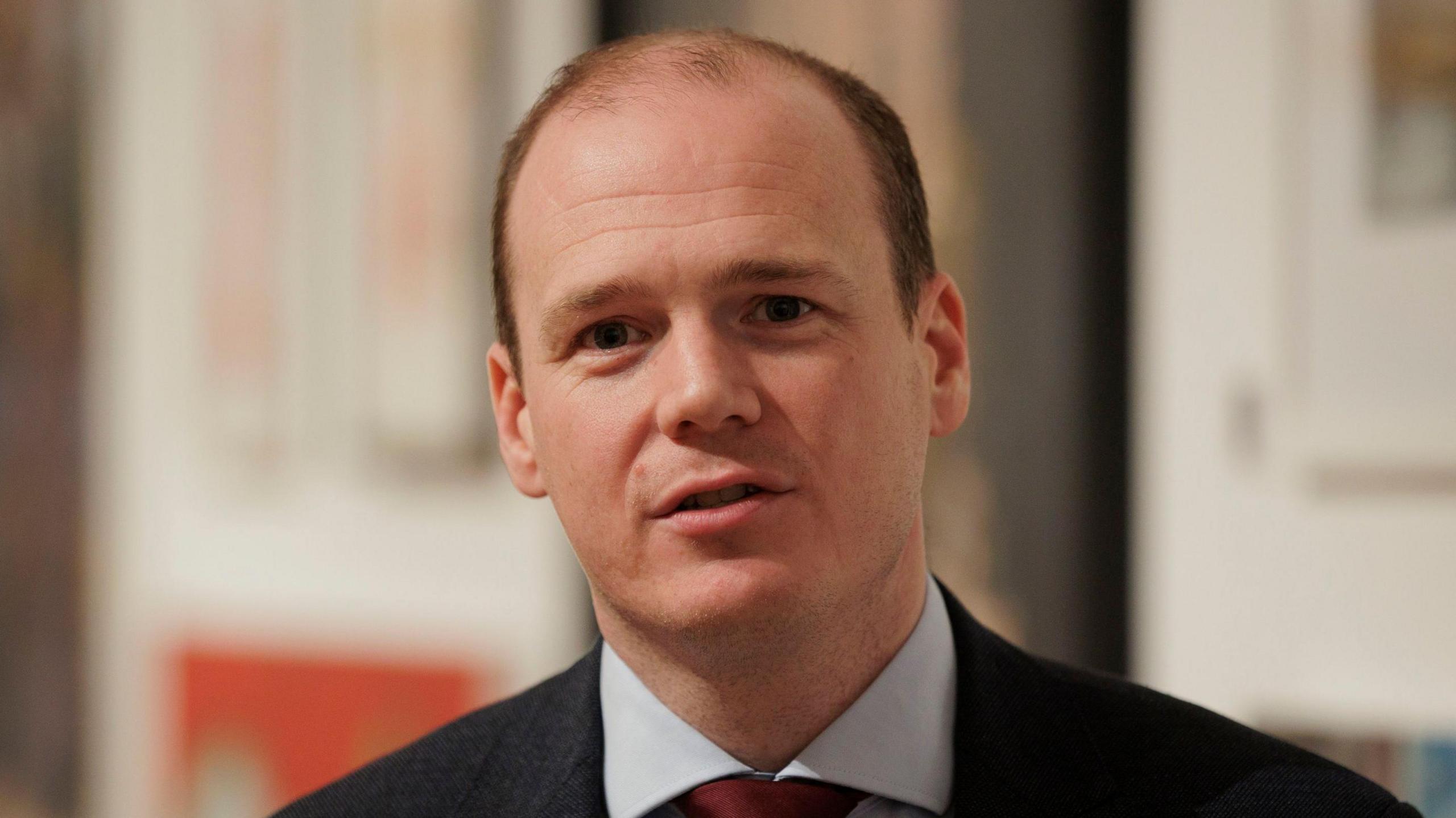
Communities Minister Gordon Lyons said the short-notice postponement of some football games was "totally unacceptable"
'Gesture of goodwill'
Six Irish Premiership football matches were cancelled on Saturday due to the storm.
Northern Ireland Football League chief executive Gerard Lawlor apologised to fans for the short-notice announcements.
Mr Lawlor told Good Morning Ulster: "If people are out of pocket as supporters clubs, we will look as seeing can we help in some way as a gesture of goodwill."
Communities Minister Gordon Lyons told BBC's Good Morning Ulster programme on Monday: "The frustration comes from the fact that many people felt with the weather the way it was, there was an inevitability to all this happening and it could have been done earlier.
"It's especially important that there was a recognition that there was a financial cost to fans and to clubs."
Related topics
- Attribution
- Published9 December 2024
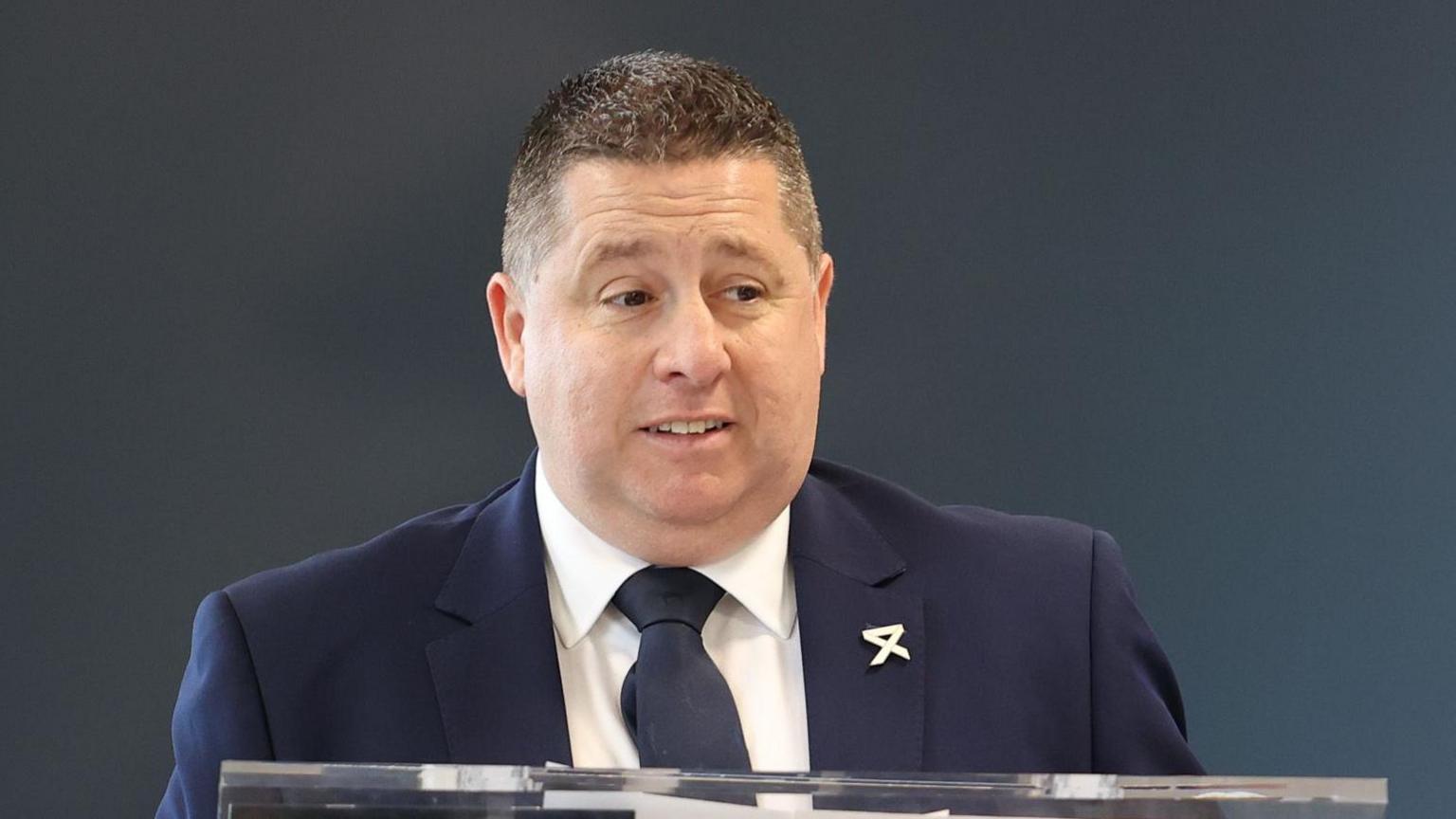
- Published8 December 2024
